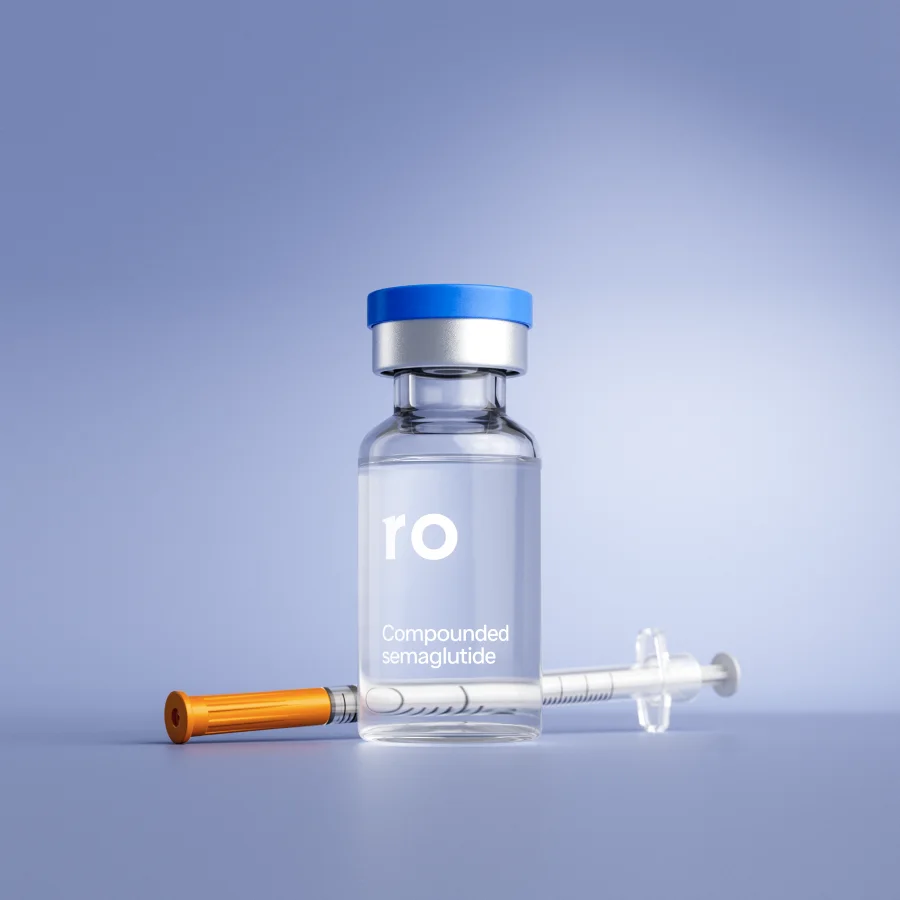

In stock
Compounded semaglutide
Get medication faster
Same active ingredient as Ozempic® and Wegovy®
Free shipping in 1-4 days, once prescribed
More on compounding: Compounded drugs are permitted to be prescribed under federal law and are not subject to FDA approval. Each batch of the compounded semaglutide offered through Ro undergoes extensive quality assurance procedures before being shipped to patients. Read more about compounded semaglutide below.
Here’s how it works
01
Give your preference
Tell your provider if you're interested in compounded semaglutide in your online visit.
02
Provider review
Your provider will look at where you are in your treatment journey and determine the right dose of compounded medication for you.
03
Get medication, if prescribed
We'll send your prescription to be filled as quickly as possible. You'll have your medication in hand in 1-4 days.
Compounded semaglutide 101
What is compounded semaglutide?
Compounding is the process of creating a medication that’s tailored to the needs of an individual patient. For example, some patients may need a medication in liquid form when the FDA-approved drug comes in a pill. Additionally, a pharmacy can compound medications of FDA-approved drugs that are in shortage.
Compounded drugs are prepared by state-licensed compounding pharmacies that meet FDA and state requirements, including quality standards. When compounding in compliance with federal law, compounded drugs are not subject to FDA approval and do not have to undergo safety, effectiveness, or manufacturing review.
Ro is partnering with compounding pharmacies to offer a compounded formulation that uses semaglutide base, the same active ingredient as Ozempic and Wegovy. We are not offering semaglutide salts (which are not the same active ingredient as Ozempic and Wegovy).
Is this the same drug as Ozempic/Zepbound/Wegovy/Saxenda?
This compounded GLP-1 has the same active pharmaceutical ingredient (semaglutide) as Ozempic and Wegovy, but cannot be considered identical to the branded medication. Zepbound has a different active pharmaceutical ingredient (tirzepatide) and so does Saxenda (liraglutide).
Where is compounded semaglutide made?
Ro works with state-licensed compounding pharmacies to produce compounded semaglutide. Compounding is regulated by both FDA and state boards of pharmacy. A licensed compounding pharmacy must comply with both federal and state laws, which include administrative requirements and quality standards.
What is the dosing for compounded semaglutide?
Dosing starts low, then gradually increases over the first few months until a steady dose is reached. If prescribed, your Ro-affiliated provider will work with you to find the right schedule and dosing for you.
How do you take compounded semaglutide?
Compounded semaglutide offered by Ro comes in small glass vials that you must carefully prepare to self-administer the injectable medication.
To prepare each dose, clean the top of the vial with an alcohol wipe, and draw the appropriate amount of medication into the syringe. Like Wegovy and Ozempic, compounded semaglutide is injected weekly in your abdomen, thigh, or upper arm.
Potential risks of self-prepared dosing:
Administering a higher dose than recommended can lead to unwanted effects such as severe nausea, severe vomiting, and severe hypoglycemia.
Administering a lower dose than recommended can lead to inadequate treatment.
Improper cleaning can lead to infection.
If you’re prescribed medication, you'll receive additional training to guide you on safely preparing your dose for self-administration to minimize these risks.
Will my insurance cover compounded semaglutide?
Compounded semaglutide prescribed by Ro-affiliated providers is not covered by insurance. We offer compounded semaglutide for $299/month. Monthly membership and one-time lab test not included.
Is compounded semaglutide offered in my state?
Compounded semaglutide through Ro is available in 41 states. It’s not currently offered in Alabama, Alaska, Arkansas, California, Hawaii, Louisiana, Mississippi, Virginia, and the District of Columbia.
How much does compounded semaglutide cost?
Compounded semaglutide costs $299/month—no insurance needed. Monthly membership and one-time lab test not included.
Are there foods to avoid while taking compounded semaglutide?
In general, there aren't foods you must avoid while taking compounded semaglutide. However, everybody reacts differently to medication, so it's important to listen to your body and change your diet if you're experiencing side effects.
It's a good rule of thumb to avoid foods that make you feel gassy or bloated, especially on the days when you increase your dose.
What are the most common compounded semaglutide side effects?
Semaglutide’s most common side effects often improve within the first few weeks of treatment. Some of the most common side effects include:
Nausea
Vomiting
Upset stomach
Stomach pains
Constipation
Diarrhea
Heartburn
Acid reflux
Belching and gas
Dizziness
Headaches
Fatigue
More severe side effects are rarer but possible. Serious side effects include:
Thyroid cancer—The FDA has issued its most serious warning (called a Boxed Warning) that GLP-1s may be associated with a type of thyroid cancer called medullary thyroid carcinoma. So far, this side effect has primarily been seen in laboratory studies using rodents, so the risk to humans has not been determined.
Pancreatitis
Gallbladder disease
Rapid heartbeat
Severe allergy (hypersensitivity)
Low blood sugar
Vision problems (diabetic retinopathy)
Kidney disease
Suicidal thoughts or behaviors
For complete safety information, including the boxed warning, please see full Important Safety Information.